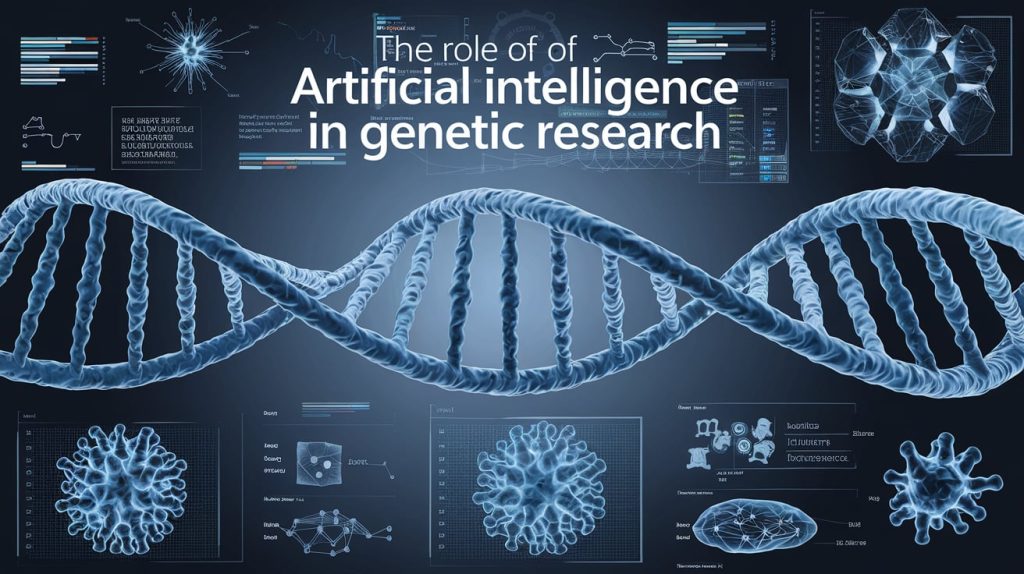Table of Contents
Advancements in genetic research have transformed our understanding of biology and human health. At the forefront of these breakthroughs is artificial intelligence (AI), a revolutionary technology reshaping the landscape of genetic studies. By leveraging AI’s data processing capabilities, researchers are accelerating discoveries, improving diagnoses, and developing innovative treatments. This blog explores how AI is driving progress in genetics and its implications for the future of healthcare.
The Importance of Genetic Research

Genetics is the foundation of biological science, explaining how traits are inherited and how diseases develop. Understanding the genetic code enables researchers to:
- Identify the causes of hereditary diseases.
- Develop personalized medicine tailored to an individual’s genetic makeup.
- Enhance agricultural practices through genetic engineering.
However, analyzing genomes, which consist of billions of base pairs, generates an immense amount of data. Traditional methods often struggle to process this data efficiently. This is where AI comes into play.
Learn more about the basics of genetics from Genome.gov.
AI and Genome Sequencing
Decoding DNA Faster
AI has revolutionized genome sequencing, the process of determining the complete DNA sequence of an organism. Machine learning algorithms analyze massive datasets, identifying patterns and anomalies much faster than human researchers.
For example, companies like Deep Genomics are using AI to predict how genetic mutations cause diseases, accelerating the development of targeted therapies.
Precision in Variant Identification
AI excels at pinpointing genetic variants, which are small differences in DNA that can lead to diseases. By cross-referencing these variants with vast genomic databases, AI tools can identify mutations responsible for conditions like cancer, cystic fibrosis, and Alzheimer’s.
For an in-depth explanation of AI in genome sequencing, visit Nature’s AI in Genomics article.
AI in Gene Editing
Gene-editing technologies like CRISPR-Cas9 have transformed genetic engineering. AI enhances these tools by improving precision and reducing unintended mutations, a challenge known as off-target effects.
AI-Driven CRISPR Optimization
AI models analyze DNA sequences to predict the most effective editing sites, increasing the success rate of gene-editing experiments. This advancement is crucial for developing therapies for genetic disorders such as sickle cell anemia and muscular dystrophy.
For detailed information on AI’s role in CRISPR technology, check out MIT Technology Review.
AI and Personalized Medicine

One of the most promising applications of AI in genetic research is personalized medicine. This approach tailors treatments based on an individual’s unique genetic profile.
Disease Risk Prediction
AI-powered algorithms can assess genetic data to predict an individual’s susceptibility to diseases. For instance, AI tools analyze genetic markers to estimate the risk of developing conditions like diabetes or heart disease, enabling early intervention.
Tailored Treatment Plans
In oncology, AI uses genetic information to design personalized cancer therapies. By identifying mutations in tumor DNA, AI systems suggest treatments that target specific pathways, improving patient outcomes.
Explore advancements in personalized medicine at WHO’s Genomics and Health page.
AI in Drug Discovery
Drug discovery is a time-consuming and expensive process. By integrating genetic data, AI accelerates this process, identifying potential drug candidates faster and more accurately.
Genomics-Driven Drug Development
AI tools analyze genomic datasets to uncover novel drug targets. For instance, IBM’s Watson for Drug Discovery integrates genomic data to suggest potential treatments for complex diseases.
Repurposing Existing Drugs
AI also identifies new uses for existing drugs by analyzing genetic and clinical data. This approach has been instrumental in finding treatments for rare genetic disorders.
Learn about AI’s impact on drug discovery at Pharmaceutical Journal.
Challenges and Ethical Considerations
While AI offers transformative potential in genetic research, it raises challenges and ethical concerns:
Data Privacy
Genomic data is highly sensitive. Ensuring the privacy and security of this information is crucial as AI systems process and analyze it.
Bias in AI Models
AI models trained on biased datasets may produce skewed results, potentially impacting the accuracy of genetic research. Researchers must ensure that datasets are diverse and representative.
Ethical Dilemmas in Gene Editing
The combination of AI and gene-editing tools raises ethical questions about modifying human DNA. Striking a balance between innovation and ethical responsibility is essential.
For discussions on ethics in genetic research, visit Ethical Issues in Genetics by ASHG.
The Future of AI in Genetics
The integration of AI in genetic research is just beginning. Future advancements may include:
- Real-Time Genomic Analysis: AI systems capable of analyzing genomes in real-time during medical procedures.
- Synthetic Biology: Designing artificial genes and organisms for scientific and industrial applications.
- Global Genomic Databases: Collaborative efforts to create comprehensive databases that AI can use to drive discoveries.
These innovations will not only revolutionize healthcare but also reshape industries such as agriculture, environmental science, and biotechnology.
Conclusion
The intersection of artificial intelligence and genetic research is unlocking new possibilities in understanding and treating genetic conditions. From genome sequencing to personalized medicine, AI is enhancing every aspect of genetics, paving the way for a healthier future.
By addressing ethical challenges and fostering collaboration, researchers can harness the full potential of AI to transform genetics and improve lives worldwide.
For further reading, explore The Future of AI in Genetics by NIH.
Global Collaboration in Space: The Power of Science and Technology



Pingback: Technological Solutions for Carbon Neutral Cities